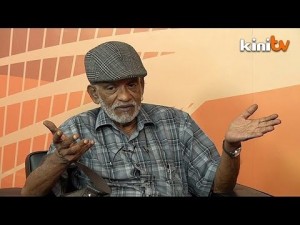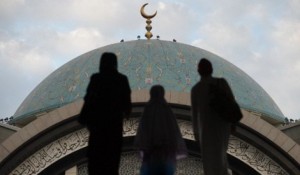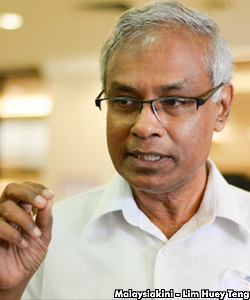“It’s a universal law – intolerance is the first sign of an inadequate education. An ill-educated person behaves with arrogant impatience, whereas truly profound education breeds humility.”
– Aleksandr Solzhenitsyn
 COMMENT I have been reading the commentary and observing the antics of our elected representatives regarding the latest provocation by PAS president Abdul Hadi Awang regarding the manufactured controversy of the tabling of the Hudud Bill.
COMMENT I have been reading the commentary and observing the antics of our elected representatives regarding the latest provocation by PAS president Abdul Hadi Awang regarding the manufactured controversy of the tabling of the Hudud Bill.
As expected, the controversy has generated the required outrage amongst Pakatan partisans and the rhetoric has neatly followed a prearranged script that the Umno state believes would distract from the very real problems that plagues this nation.
Hudud in any form would just be the cherry on the sundae of the fascist agenda that this regime is executing in terms of its security policies meant to stifle dissent and sustain hegemony. The fact that the opposition establishment is suffering from self-inflicted political wounds and myopic in its political agenda not only helps the deterioration of this country but also gives the Umno state breathing room to regroup and advance its agenda.
Therefore, it was a pleasure reading PSM’s Dr Jeyakumar Devaraj’s piece on the hudud controversy. As usual, the good doctor clearly articulated the supposed controversy and with a level-headedness unsuited for the cut-throat take-no-prisoners world of politics, and made suggestions on how to deal with the issue. He did the same with the Lynas controversy, a sane voice amongst the lunacy and political opportunism but as usual, his pleas feel on deaf ears.
The honourable member from Sungai Siput did raise some pertinent questions in his piece that I believe deserve answers or at the very least a public answer on behalf of Malaysians who may have the same perspective as me on this issue.
Malaysians who may have the same perspective as me on this issue.
Jeyakumar’s analysis of the political motives of Umno and the opposition are spot on and there really is nothing to discuss. However, the member of parliament raises interesting questions that are fodder for a public debate.
Readers should be aware that PAS grassroots members who have worked with Jeyakumar have told me that the good doctor is someone who truly cares about Malaysians without regard for their race or religion. This particular politician is someone who should be emulated and it is to our detriment that there few of our elected representatives are cut from the same cloth.
My answers here are not to be construed as an attack on the good doctor’s article but rather as a launching pad for some of my own beliefs.
Jeyakumar (photo) said, “We should not be afraid to discuss religious issues, but should take extra care to be respectful to the beliefs of others. This implies a certain  acceptance of diversity.”
acceptance of diversity.”
The problem with a statement like this is that the only definition of Islam that matters in this country is how the Umno state defines it and we get an idea of how this regime defines Islam with this quote from Dr Asyraf Wajdi Dusuki, the deputy minister in charge of Islamic affairs:
“It’s time for the allowances of imams, religious teachers and staff throughout Malaysia to be reviewed for an increase (this year alone, the allocation of allowances for imams and religious teachers amounted close to RM500 million), seeing that their responsibility in safeguarding Islam is even more challenging today with plenty of extremist ideologies that are starting to take root, such as IS, the liberalism ideology and pluralism, including the LGBTs who loosen and degrade religion.”
What does this mean? Well, it means firstly, that this regime does not accept diversity as an acceptable form of compromise in a diverse social, political and religious polity, and secondly, that people who do believe in certain fundamental rights, should not accept intolerant religious views as an example of “diversity”.
Do non-Muslims have a right to object to the way in which Muslims choose to practice their religion?
Herein lays the problem. The question sets up an ‘us versus them’ dialectic, of non-Muslims versus Muslims. Nobody has a right to tell anyone how to practice his or her religion including the state whose religious laws (as Jeyakumar acknowledges) has far-reaching consequences for all the country’s citizens.
When we object to certain practices of the state which we deem immoral or corrupt, we do so as citizens of the country. The same principle applies to certain religious practices. We speak for those who cannot, we support those who have been unfairly targeted and who have no choice as to whether they accept or reject religious dogma as defined by the state.
Across the world, regimes who actively oppose secularism, the agenda is to separate communities either by religion or race and the means by which they do to this is through legislation. If communities cannot come together to oppose injustice or prejudice, merely because such are defined as religious imperatives, there can be no hope for change.
Can we tell Muslims how to practice their religion?
Why not? Muslim regimes have no problem defining the Other’s religion. In this country, there are numerous examples of how Muslim dictate how non-Muslims practice their religion. The problem here is that freedom of expression and speech is selectively practiced. As the good doctor illustrated, there are diverse views on Islam in this country.
Islamic perspectives could change and evolve through interaction with other perspectives. Christianity and Judaism are examples of the Abrahamic faiths which have evolved through interactions with other religious and seculars points of views. This is the reason why certain Muslim regimes are deathly afraid that their dogma would be rejected if there is a free exchange of ideas.
But the problem here is not non-Muslims telling Muslims how to practice their religion. It is the state telling Muslims how to practice their religion. It is the state rejecting diversity in the Muslim Malaysian experience and non-Muslims are caught in the crossfire.
Do we not believe that each religious community has the right to practice their religion freely?
I for one believe that each community has a right to practice their religion freely without interference from the state. I believe that the state should not impose its religious dogma on any of its citizen even indirectly. I believe that a citizen should define his or her religious beliefs for themselves and as long as it does not impugn on the rights of others, should escape sanction from the state. In fact, I believe that the state should have no say in the religious beliefs of its citizens, much less demand billions of tax ringgit to enforce state-sanctioned dogma.
Don’t we recognise that the entire Islamic world is struggling to define what it means to be true to their faith as Muslims in the 21st century? Do we expect Muslim Malaysians to be unaffected by the ongoing debate/battle?
I recognise (as do many other Malaysians, including Muslims) that Islam in this country is affected by the petrodollars of the Saudi regime as evidenced by the so-called donation to our current prime minister for defending Islam. I recognise that there is a deliberate effort by the House of Saud and its tributaries to silence the diversity in Islam. I recognise that the religious schisms within Islam affects minority Islamic brethren the world over and that being true to their faiths is being hampered by the stratagems from palaces in Saudi Arabia.
I also believe that forming strategic alliances with Islamic parties does no good for the idea of democracy in any country in the long term. I believe that political grandstanding by certain political parties in this country in lieu of concrete principles is why Islam has dominated the discourse in an adverse way.
Lastly, I know many people would not agree with me for various political or pragmatic reasons and while I have rambled on, my stand is exactly the position of PSM. Here is their message on religion on their website:
“PSM berpendirian hak kepercayaan beragama atau tidak adalah hak individu dan mesti dihormati. Ia adalah hubungan peribadi antara manusia dan kepercayaan mereka. Ia tidak boleh dipaksakan melalui undang-undang.”
S THAYAPARAN is Commander (Rtd) of the Royal Malaysian Navy.
Read more: https://www.malaysiakini.com/columns/343678#ixzz4AI1i694Y
























